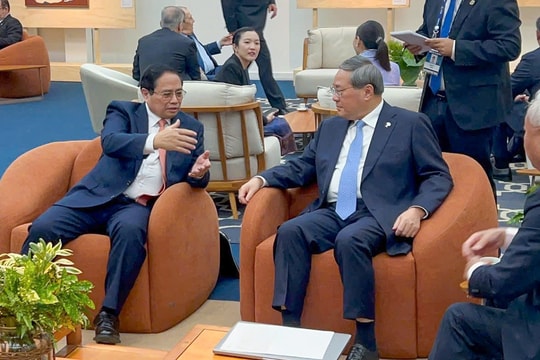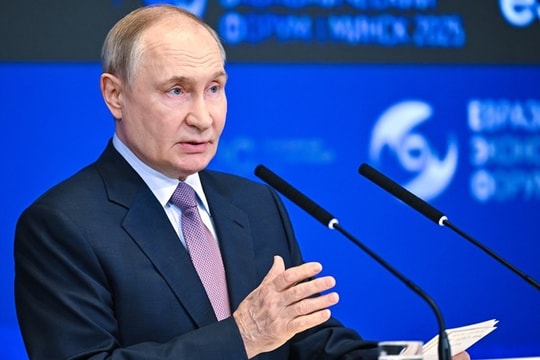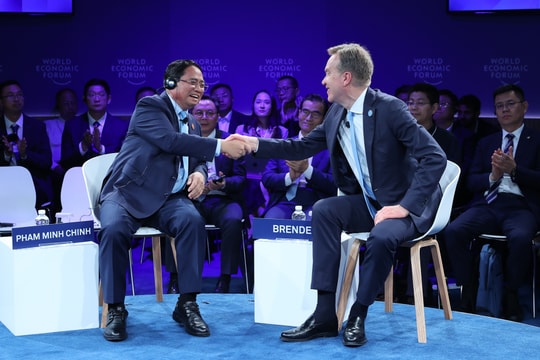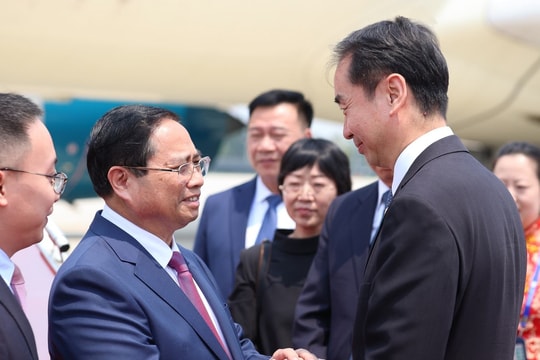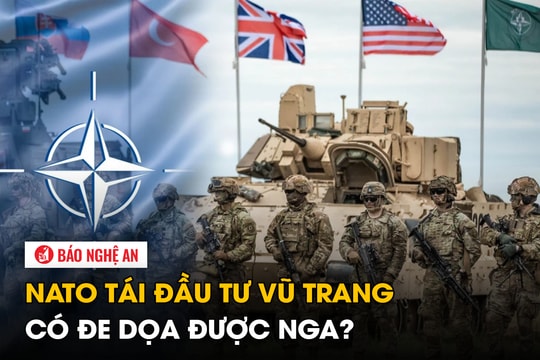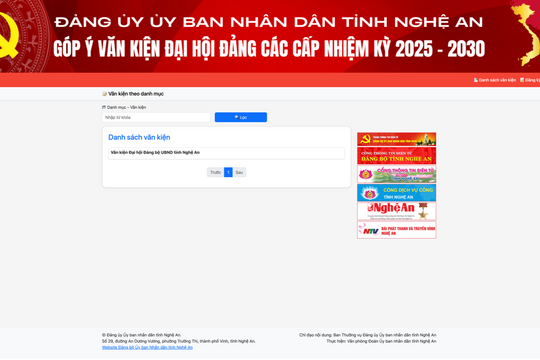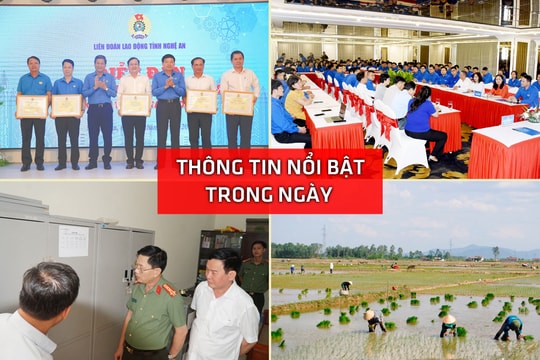'Vietnam is ready to take on the role of host of APEC Year 2017'
Since January 1, Vietnam has officially assumed the role of host of the Asia-Pacific Economic Cooperation (APEC) Forum activities throughout 2017.
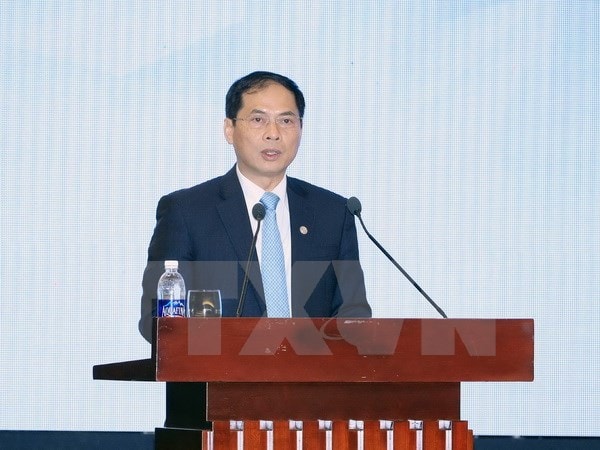 |
| Deputy Foreign Minister Bui Thanh Son speaks. (Photo: VNA) |
After nearly two decades of accompanying the APEC Forum, this is the second time Vietnam has had the honor of taking on this responsibility. It is also a great opportunity for Vietnam to strengthen relations with partners in the region, contribute to the common interests of Asia-Pacific, and enhance its role and position in the international arena.
On this occasion, Permanent Deputy Minister of Foreign Affairs Bui Thanh Son, Vice Chairman of the APEC 2017 National Committee, Chairman of SOM APEC 2017 gave an interview to the press.
APEC Year 2017 - Challenges and Opportunities
This is the second time Vietnam has been honored to take on the responsibility of hosting the Asia-Pacific Economic Cooperation Forum. Can the Deputy Minister tell us what challenges and opportunities Vietnam will face in APEC Year 2017?
Deputy Minister of Foreign Affairs Bui Thanh Son:After more than 10 years of hosting the APEC Year for the first time in 2006, Vietnam has once again been trusted by international friends to take on the responsibility of hosting the activities of the Asia-Pacific Economic Cooperation Forum, becoming one of the few countries to be entrusted with this important task twice in just over a decade. This is a vivid demonstration of the trust that the international and regional communities have placed in Vietnam. "Proactively" shouldering this responsibility is also an important step in implementing our country's overall international integration strategy, in which the Asia-Pacific region is a focus.
Taking place in the context of the world and regional situation having many profound and unpredictable changes, the Asia-Pacific Economic Cooperation Forum in 2017 and the coming years is forecast to face many new challenges.
The biggest challenge for members of the Asia-Pacific Economic Cooperation Forum in general and Vietnam in particular in the new situation is how to maintain the Forum's role as the leading economic cooperation and linkage mechanism in the region, contributing to promoting growth and prosperity in Asia-Pacific, as the initial goal set by members when the Forum was established in 1989.
It is also a challenge to continue joint efforts on trade and investment liberalization and facilitation in the region, including the completion of the Bogor Goals by 2020 as scheduled, when the trend of increasing protectionism and inward-looking is emerging in some economies.
In addition, there is also the challenge of enhancing the Forum's contribution to solving global challenges of job creation, reducing inequality, climate change, terrorism, food security, population aging, migration, etc. Doing this means that the Asia-Pacific Economic Cooperation Forum will make a practical contribution to implementing the common goals of humanity on sustainable development and responding to climate change and many other challenges that the world is facing.
However, from another perspective, the above situation also opens up new opportunities for cooperation prospects of the Forum and its members.
The more the world and regional environment for peace and development is challenged, the more the need for cooperation and connectivity between regions and countries in the Asia-Pacific increases. This is a great opportunity for members of the Asia-Pacific Economic Cooperation Forum to promote deeper and broader cooperation.
In fact, the potential for cooperation at the Asia-Pacific Economic Cooperation Forum has never been as deep and broad as it is today. After nearly three decades of development, the number of committees and working groups of the Forum has increased nearly threefold, to about 50, covering many areas, not only purely economic and trade issues but also expanding to new-generation economic-trade issues, sustainable development, narrowing the development gap, food security, energy security, etc.
While global economic and trade growth is slowing down and anti-globalization trends are emerging in some regions, Asia-Pacific continues to be the world's leading dynamic development region, the driving force of global growth and connectivity, in which many member economies of the Asia-Pacific Economic Cooperation Forum play a pivotal role.
With the principles of mutual benefit, consensus, voluntariness and non-binding, the Asia-Pacific Economic Cooperation Forum continues to pioneer many global efforts on trade and investment liberalization. These include comprehensive connectivity, facilitating supply chains, supporting small and medium enterprises to improve their competitiveness and participate in global value and supply chains, digital economy, network economy, etc. Trade facilitation in the region has also achieved positive results. In just 4 years, from 2010-2014, trade transaction costs among APEC members have decreased by 12%. Many economies of the Forum continue to be the locomotives of international economic integration.
For Vietnam, the great advantage is that our country has experience in organizing APEC Year 2006 and taking on many multilateral responsibilities during many years of international integration. The country's internal strength has been enhanced after 30 years of renovation. Vietnam is one of the leading APEC economies in growth and regional connectivity. In the first 8 months of 2016, despite the decline in world trade, we are one of the few APEC economies that maintained export growth. Domestically, the Government is comprehensively and synchronously promoting innovation, restructuring associated with transforming the growth model. By participating in many large-scale free trade agreements (FTAs) such as TPP, RCEP, FTA with the Eurasian Economic Union, etc., Vietnam has become an important link in a large economic network with 59 partners, including 18 APEC members. We also continue to promote our independent and self-reliant foreign affairs, gaining the trust and appreciation of international friends.
On the other hand, with great expectations and a huge amount of work to prepare, APEC Year 2017 requires the active participation of all levels and sectors, especially the business community, scholars and people nationwide. I believe that the consensus and determination of the entire political system is the greatest lesson of success that we need to promote in APEC Year 2017.
2016, the final stretch of preparation work
Deputy Minister, can you tell us about Vietnam's preparations for APEC Year 2017 in recent times?
Deputy Minister of Foreign Affairs Bui Thanh Son:With nearly 200 large and small activities at all levels revolving around the theme “Creating new momentum, fostering a common future”, spanning across 10 provinces and cities from North to South throughout 2017, the most important of which is the Summit Week taking place in November in Da Nang city, APEC Year 2017 is the largest-scale foreign affairs activity that Vietnam will organize from now until 2020.
Aware of the responsibility and the huge amount of work that needs to be done, Vietnam has urgently started the preparation work nearly three years ago. In 2014 and 2015, Vietnam actively exchanged and proactively coordinated with APEC Year hosts to learn from their experiences in content preparation, logistics facilities, reception, press, etc. The organizational apparatus was also soon formed with the establishment of the APEC 2017 National Committee in July 2015, chaired by Deputy Prime Minister and Minister of Foreign Affairs Pham Binh Minh and the participation of 24 ministries, agencies and member provinces. With five sub-committees in charge of content, material and logistics, security and health, propaganda and culture and reception, this is the key mechanism to ensure overall coordination of all preparations and organization of APEC 2017.
Based on lessons learned from other countries as well as Vietnam’s experience in multilateral foreign affairs, we have also promptly completed long-term orientation documents for the organization, from selecting the venue for the Summit Week and key activities in 2017, developing proposals on themes and priorities, and staff training, etc. to ensure that preparations for APEC Year are synchronous, effective and on schedule.
It can be said that, up to now, preparations in all aspects have been basically completed according to schedule so that Vietnam is ready to take on the role of host of APEC Year 2017.
In terms of content, we have made efforts to ensure that our country's proposals, ideas and initiatives are in line with the common concerns of the region and in line with the general trend of global cooperation, while reflecting the concerns of developing economies, including our country and ASEAN members. Thanks to careful preparation and early support from member economies of the Asia-Pacific Economic Cooperation Forum and international organizations, the topics and priorities proposed by our country received consensus from members at the informal meeting of senior officials of the Asia-Pacific Economic Cooperation Forum in Hanoi in early December.
Preparations for facilities, logistics, communications, etc. have been pushed forward. Relevant ministries, agencies and provinces have actively participated in speeding up the preparation of facilities in Da Nang city and localities selected to host APEC activities. The official website of APEC 2017 has been put into operation since the end of November 2016, ensuring timely and practical information about the Forum and APEC 2017, as well as facilitating international delegates and reporters to register to attend activities at the Forum. The selection of the logo and identity of APEC 2017 has also been completed, along with short films and publications to introduce APEC 2017, etc. to promote the image of the country and people as well as the investment, business and tourism potential of Vietnam. Preparations for reception and staff training have also been urgently implemented.
Key to success
According to the Deputy Minister, in the coming time, how will ministries, branches, localities and enterprises actively prepare for APEC Year 2017?
Deputy Minister of Foreign Affairs Bui Thanh Son:During its nearly 20-year journey as a member of the Asia-Pacific Economic Cooperation Forum, Vietnam has always affirmed its role as an active and proactive member with practical contributions to the cooperation process of the Forum.
Therefore, in order for APEC 2017 to be a breakthrough year in implementing the policy of deep international integration and contributing to bringing the policy of the 12th Party Congress on "improving the quality and effectiveness of multilateral foreign affairs" into life, more than ever, it is necessary to have more active and proactive participation from ministries, branches, enterprises and localities.
To do this, first of all, ministries, sectors, enterprises and localities need to have new thinking and new ways of doing things in participating and implementing multilateral foreign affairs, including participating in the Asia-Pacific Economic Cooperation Forum. That is the thinking and way of doing things associated with the spirit of "proactively initiating, contributing ideas and initiatives, participating in shaping" regional and global mechanisms and rules of the game.
For ministries and sectors, from now until the end of 2018 is a “test of fire” period when Vietnam will assume the role of chairing and coordinating the activities of about 20 out of more than 50 committees and working groups of the Asia-Pacific Economic Cooperation Forum. Accordingly, an important requirement is that ministries and sectors need to urgently prepare a team with professional capacity, foreign language proficiency, mettle and multilateral skills… to seize the opportunities of APEC Year 2017 and contribute to the orientation of the Forum’s cooperation activities.
The diverse activities of the Asia-Pacific Economic Cooperation Forum throughout 2017 will be an opportunity for businesses and localities to boost business, connect, increase tourism attraction, promote the image of the country and people of Vietnam as well as introduce strengths and potential for cooperation with leading partners in the region and the world. To realize these opportunities, businesses and localities need to prepare carefully, proactively learn about the tastes and needs of partners and markets in the region, form and implement ideas to promote their strengths and identities... Businesses and localities also need to take advantage of this opportunity to improve their international integration capacity and gradually contribute to building a culture of integration in Vietnam.
As one of the few multilateral cooperation mechanisms that promote the participation and contribution of the business community, in 2017, there will be many activities of the Asia-Pacific Economic Cooperation Forum associated with businesses. Vietnamese businesses need to make efforts to promote their role on these occasions, through contributing ideas and initiatives to promote cooperation. The Forum will bring practical and specific results for businesses and people. In particular, the participation and contribution of businesses at the Asia-Pacific Economic Cooperation Forum CEO Summit, meetings of the Asia-Pacific Economic Cooperation Forum Business Advisory Council, etc.
With the close direction of senior leaders and the active participation of ministries, sectors, businesses and localities, we have every reason to believe that APEC Vietnam Year 2017 will be a great success.
Dear Deputy Minister, what can news agencies do to contribute to the success of APEC Vietnam Year 2017?
Deputy Minister of Foreign Affairs Bui Thanh Son:For a long time, the press has had a great impact on social life, and plays a very important role in the success of the country's major foreign affairs events. In today's era when technology, especially digital technology, is developing rapidly, the power of the press is increasingly enhanced. The press not only influences and guides public opinion, but also creates opportunities for multi-dimensional interaction, allowing agencies and policy makers to grasp and better understand the thoughts of the people and businesses in order to make correct and appropriate decisions.
Press communications work for the APEC Forum and APEC members is also very important. The APEC International Secretariat's Public Relations and Press Unit was established nearly 20 years ago, with long-term operational orientations. 10% of the APEC International Secretariat's staff focuses on press communications work, although the total number of staff is quite limited, about 40 people, and they have to handle a large amount of work. These figures demonstrate APEC's respect for the press and media.
At the APEC Informal Senior Officials Meeting in Hanoi last December, many APEC members emphasized the need to enhance information work so that people and businesses can better understand the Forum and its practical and specific contributions to growth, trade and investment liberalization of economies and improving people's quality of life. This is a legitimate need of members in the context of the emerging trend of anti-trade and investment liberalization, populism, protectionism, etc. At the same time, this need opens up a great opportunity for the press to promote its role in APEC Year 2017.
I believe that in 2017, the press agencies will play a bridging role, bringing APEC closer to localities, businesses and people.
For domestic readers and audiences, we hope that press agencies will proactively convey the major messages of APEC 2017 to localities, businesses and people. Topics, columns, and specific programs on APEC need to be enhanced to inform all people about the major activities and key cooperation contents of APEC in 2017, the significance and benefits that APEC can bring to us. Thereby, creating a mindset for localities, businesses, and people of all walks of life to be ready to accompany and contribute to APEC activities, ensuring the creation of more successful imprints of APEC Year 2017 in Vietnam.
To international friends, the press needs to contribute to introducing the image of a Vietnam determined to innovate and integrate deeply; Vietnamese people are friendly, gentle, and hospitable; and a Vietnamese economy full of potential for cooperation and investment.
On the occasion of APEC activities, we also hope that Vietnamese press agencies will have the opportunity to connect and meet with regional media agencies and the international APEC Secretariat media agencies to exchange and propose ideas and initiatives on communication, thereby showing the image of a dynamic Vietnam, always keeping up with the progress of the 21st century.
On behalf of the APEC 2017 National Committee, we will provide full information and create all conditions to support reporters in their work and reporting on APEC activities in 2017.
Thank you very much!./.
| RELATED NEWS |
|---|

